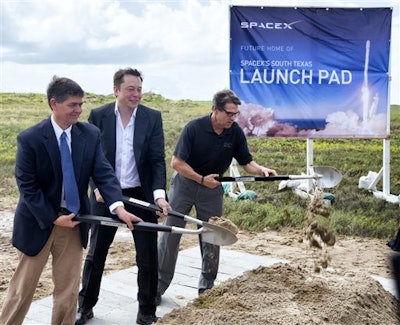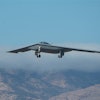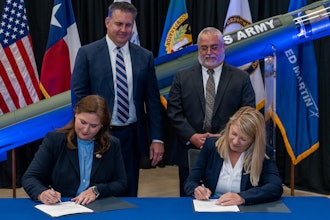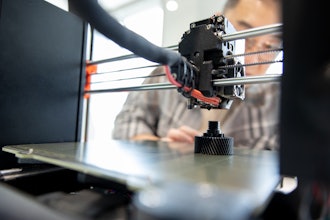
 An isolated edge of vast West Texas is home to a highly secretive part of the 21st-century space race, one of two being directed in the Lone Star State by Internet billionaires whose personalities and corporate strategies seem worlds apart.
An isolated edge of vast West Texas is home to a highly secretive part of the 21st-century space race, one of two being directed in the Lone Star State by Internet billionaires whose personalities and corporate strategies seem worlds apart.
The presence of Blue Origin, LLC, the brainchild of Amazon founder Jeff Bezos, barely registers in nearby Van Horn, a way station along Interstate 10, a full decade after he began buying land in one of Texas' largest and most remote counties.
Few visitors are allowed beyond the "No Trespassing" sign and a remote-controlled gate and into the desert and mountain environment reminiscent of the Air Force's renowned Area 51 in Nevada. The privileged who do get inside decline to describe what they've seen, typically citing confidentiality agreements.
"No one gets in other than employees," says Robert Morales, editor of the weekly Van Horn Advocate newspaper.
At the opposite end — of Texas and the competition — is the highly visible SpaceX venture, led by PayPal co-founder and electric car maker Elon Musk. His company contracts with NASA to resupply the International Space Station and is building a launch site about 600 miles from Van Horn, on the southernmost Texas Gulf coast, with the much-publicized goal of sending humans to Mars.
SpaceX and Blue Origin are among several U.S. companies engaged in the private space business. Both men have seemingly unlimited resources — Bezos' wealth is estimated at nearly $35 billion, Musk's at $12 billion — and lofty aspirations: launching a new era of commercial space operations, in part by cutting costs through reusable rockets.
Texas' glory days of space exploration, when "Right Stuff" Mercury astronauts trained in Houston and the city's name was the first word spoken on the moon by Neil Armstrong, are long gone. The utilitarian Space Shuttle fell to budget cuts, depletion and age, leaving astronauts to hitch rides on Russian rockets.
Any success by the newcomers would offer "significant potential for re-invigorating space research and development in the state," said John Junkins, director of the Center for Mechanics and Control at Texas A&M's Department of Aerospace Engineering.
Earlier this month, Bezos announced his company's new hydrogen rocket engine, designed for suborbital missions, had completed hundreds of tests at the West Texas site, adding, "soon we'll put it to the ultimate test of flight." That could come late this year.
A more powerful engine for orbital flights, fueled by liquid oxygen and liquid natural gas, is being developed with United Launch Alliance, a venture of aerospace veterans Boeing Co. and Lockheed Martin Corp.
Blue Origin officials declined requests for an interview and site visit. "I'm so sorry," spokeswoman Brooke Crawford said. "It's just the way it is."
Bezos' love of space originated in Texas in the 1960s when his family moved to Houston, which dubbed itself "Space City USA."
"For me, space is something that I have been in love with since I was 5 years old," Bezos, 51, said in a September interview with The Washington Post, which he purchased in 2013. "I watched Neil Armstrong step onto the surface of the moon, and I guess it imprinted me."
Over the last decade, he has bought at least seven ranches, totaling 1,900 square miles, near the Texas-New Mexico border and Guadalupe Mountains National Park.
"It's very secretive out there," said Maricel Gonzalez, chief appraiser for the Culberson County Appraisal District. She declined to describe it, citing a nondisclosure agreement. A UPS driver who recently emerged from the compound also declined to talk.
Nuny Morriss, a Van Horn city council member and FedEx delivery driver, said the site includes a "big warehouse-looking building and some offices ... But they don't let us go around in the back."
Blue Origin's presence in Van Horn is minimal. Morriss recalled word getting out a few years ago about a scheduled launch. Traffic at the local airstrip suggested that VIPs were coming in, and local officials were eager to join them. "No one in town got invited," Morriss said.
By contrast, SpaceX is frequently in the headlines thanks to its nearly $2 billion federal contract. Attempts to reuse booster rockets have been rocky; it's failed three times to land them on a platform off the Florida coast.
SpaceX already has a rocket plant near Waco. With more than $15 million in state incentives, it's also building a launch site at Boca Chica Beach, near Brownsville. Musk hopes for at least 12 rocket launches a year, starting late next year.
"The long-term goal is to create technology necessary to take humanity beyond Earth," said the 43-year-old South Africa native.
David Kanipe, a former NASA division chief now teaching at Texas A&M, says Musk and Bezos were cool to his offers of assistance.
"A lot of time these companies, maybe for good reason, they don't really want to use or benefit from the lessons learned from what NASA did for 40 years, 50 years," Kanipe said. "I pleaded with them: 'Let us help, use our experience.' But they have other ideas."
All of the private space businesses have had setbacks, such as Richard Branson's Virgin Galactic, which lost a spacecraft and a pilot in October over California's Mojave Desert.
"There's just a million ways it can go wrong," Kanipe said. "I think it's doable, but it's just going to take a while."






















